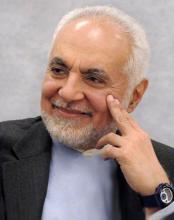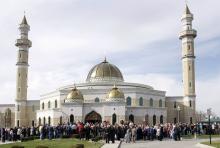ground zero mosque

Imam Feisal Abdul Rauf has spent most of his adult life trying to build interfaith and international bridges. But to many Americans, he is the public face of the so-called "Ground Zero mosque," one of the most controversial religious projects in recent U.S. history.
Rauf reflects on that turmoil in his new book, Moving the Mountain: Beyond Ground Zero to a New Vision of Islam in America. But as the book's subtitle suggests, the longtime imam spends most of his time facing forward — toward the development of a distinctly American brand of Islam. He spoke recently with Religion News Service. This interview has been edited for length and clarity.
Q: Why did you write this book?
A: I wrote this book because the American public saw me and heard me, but really didn’t get to know me very well, or to understand what my work was all about. This book is my calling card to the American public.

Mohammed Labadi had a lot at stake when the DeKalb City Council voted on May 29 on a request from the Islamic Society of Northern Illinois University to build a two-story mosque.
Labadi, a businessman and Islamic Society board member, said a bigger mosque is needed to replace the small house where local Muslims now worship. He also was hoping for affirmation that his neighbors and city officials have no fear of the Muslim community.
"Don't look at me just as a Muslim, look at me as an American," Labadi said. It's time, he says, "to take the unfortunate stereotypes about Muslims out of the picture." The City Council unanimously approved the plan.
In the decade since the 9/11 terrorist attacks, animosity toward Muslims sometimes has taken the form of opposition to construction of mosques and other Islamic facilities. National debate erupted over plans for an Islamic community center that became known as the "Ground Zero mosque" in Lower Manhattan.